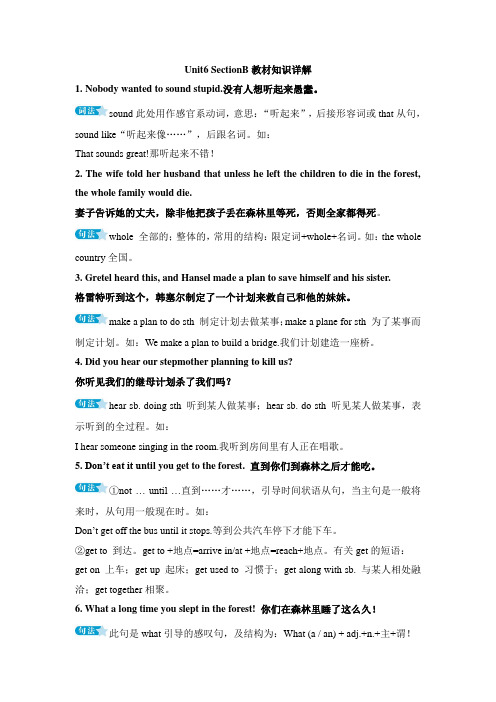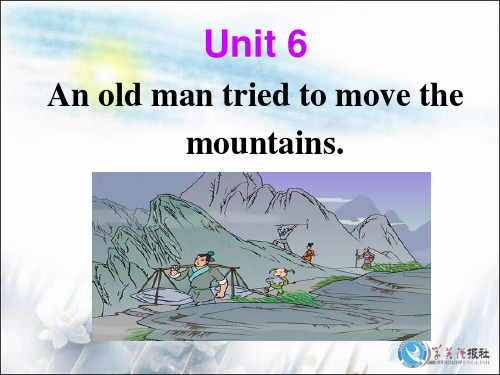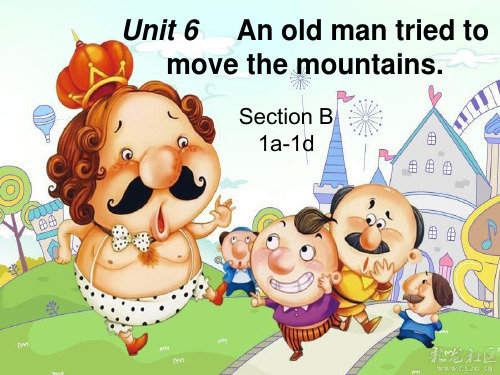2014春八年级下unit6sectionB
- 格式:ppt
- 大小:9.55 MB
- 文档页数:23


Unit6 SectionB教材知识详解1.Nobody wanted to sound stupid.没有人想听起来愚蠢。
sound此处用作感官系动词,意思:“听起来”,后接形容词或that从句,sound like“听起来像……”,后跟名词。
如:That sounds great!那听起来不错!2. The wife told her husband that unless he left the children to die in the forest, the whole family would die.妻子告诉她的丈夫,除非他把孩子丢在森林里等死,否则全家都得死。
whole 全部的;整体的,常用的结构:限定词+whole+名词。
如:the whole country全国。
3. Gretel heard this, and Hansel made a plan to save himself and his sister.格雷特听到这个,韩塞尔制定了一个计划来救自己和他的妹妹。
make a plan to do sth 制定计划去做某事;make a plane for sth 为了某事而制定计划。
如:We make a plan to build a bridge.我们计划建造一座桥。
4. Did you hear our stepmother planning to kill us?你听见我们的继母计划杀了我们吗?hear sb. doing sth 听到某人做某事;hear sb. do sth 听见某人做某事,表示听到的全过程。
如:I hear someone singing in the room.我听到房间里有人正在唱歌。
5. Don’t eat it u ntil you get to the forest. 直到你们到森林之后才能吃。
①not … until …直到……才……,引导时间状语从句,当主句是一般将来时,从句用一般现在时。

人教版英语八年级下册Unit 6教学设计Section BThe Emperor’s New Clothes Lesson PlanLearning ObjectivesBy the end of this class, I will be able to:1.get the main idea of the story and put the key events of the story in the right order;2.through blank filling and graphic organizer, get the details of the story and then use the graphic organizer to do the retelling;3.explain the theme of the story by comparing the boy with the other person;4. write a simple play and perform it in groups.------------------------------------------------------------------------------------------------------- Task: Complete the graphic organizer of the story.Title: ____________________________________________________________Who?When? Where? What happened at the beginning?Sample answer for the graphic organizerWhen: not stated Where: in a kingdom with its name unspecifiedWho: an emperor, two brothers, a young boy, othersWhat happens at the beginning: There is an emperor who loved clothes.Event 1: Two brothers came to the city to make special clothes for the emperor. Event 2: Two brothers were trying to cheat the emperor. They asked silk and gold as much as they can but kept everything for themselves and told the emperorthat people couldn’t see the clothes unless they were clever.Event 3: When the emperor looked at himself in the mirror, her only saw his underwear.But he didn’t want people to think he was stupid, so he said his new clotheswere very beautiful.Event 4: The emperor walked through the city wearing his new clothes. Nobody wanted to sound stupid, so everyone said his new clothes were wonderful.Event 5: Suddenly, a young boy shouted, “Look! The emperor isn’t wearing any clothes!”What happens in the end: not stated (probably everybody laughed at the king) Messages: We should speak the truth when no one else will. Pride comes before a fall. The more pride you have, the more difficult it is to admit your mistake.Sample Play for the Emperor’s New ClothesCharacters: storyteller, emperor, dresser, two brothers (slick and slicker), small child.subject 1, 2, 3, 4Storyteller: Once upon a time, there was an emperor. He didn’t spend much time ruling his empire because he was too interested in how he looked and what clotheshe wore.Emperor: (looking in the mirror) I wonder what clothes I’ll wear today.Emperor: Dresser, next week is the annual royal parade. What shall I wear? Dresser: You have 10,438 outfits to choose from.Emperor: I need something new and different. I want to look fabulous. I want the whole empire to talk about me and my beautiful clothes. Find me the finest tailorsin the land at once.(Enter Slick and Slicker.)Slick: Do you hear that? We could make lots of money.Dresser: I found the best tailors, Your Excellence.Slick: I’m Slick.Slicker: I’m Slicker. At your service. (Both bow before the emperor.)Slick: Well, you must know our clothes are very special.Emperor: Special?Slicker: Oh yes, they are magic clothes.Emperor: Magic?Slicker: Why, have you not heard? only very clever people can see our clothes. Emperor: Make me a magic outfit at once.Slicker: Well, it is very expensive.Emperor: Money is no object. Here take this. (He throws a bag of money at them.) Now get to work at once. You have only a week left to make me the mostspectacular outfit for the royal parade.(Emperor and Dresser exit.)Storyteller: News quickly spread across the empire about the magic outfit. Everyone came the day of the parade to see this fantastic suit. On the day of theparade, the emperor entered the room for the first time.Slick: (Holds up the outfit.) Well, what do you think?Emperor: (Speaks to the audience.) I can’t see anything. I must be stupid, but I can’t let them now. I’ll pretend I can see it. (Turns to Slick and Slicker.) It is amazing,magnificent, fabulous.Storyteller: He admired himself one last time. The soldiers opened the palace doors. Emperor: Let the parade commence.Storyteller: The crowd gasped with excitement. They knew only clever people could see the clothes.Subject 1: You look so handsome.Subject 2: Such an amazing outfit.Subject 3: What magnificent tailoring.Emperor: The clothes I’m wearing must be beautiful.Small child: But the emperor has no clothes on.Subject 4: What did he say?Subject 1: He said the emperor has no clothes on.Subject 3: He is right, the emperor is naked.Subject 4: The emperor has no clothes on.Storyteller: Everyone started to whisper and the whispering turned into shouting. Everyone: The emperor has no clothes on.Emperor: (Looks down.) They are right. I’ve got no clothes on. (He tries to cover himself up.)Slick and Slicker: Time to go with our bags full of money. (They tip toe off the stage quickly without anyone seeing them.)Emperor: Cover me up at once. (Dresser comes running in with a blanket.) Storyteller: The emperor got what he wished for. People talked about the emperor with no clothes for years to come.。



Section B (1a-Self Check)重点单词1. gold n. 金子2. silk n. 丝绸3. nobody pron. 没有人;n. 小人物4. stupid adj. 愚蠢的5. cheat v. 欺骗 n. 骗子6. wife n. 妻子7. husband n. 丈夫8. whole adj. 全部的,整体的9. shine v. 发光,照耀10. bright adj. 明亮的;adv. 光亮地11. ground n. 地面,地12. lead v. 带路,领路13. voice n. 声音14. brave adj. 勇敢的单词变形1. gold—golden (形容词)2. wife—wives (复数)3. shine—shone (过去式)—shone (过去分词)4. lead—led (过去式)—led (过去分词)—leader (名词)重点短语1. sound stupid 听起来很愚蠢2. try to do sth. 努力做某事3. make a plan 制订计划4. be quiet 安静5. go to sleep 去睡觉6. wake up 醒来7. on the ground 在地上8. find one's way out 找到出路重点句型1. One year, the weather was so dry that no food would grow. 有一年,天气太干燥了,以至于没有粮食生长。
2. We thought you were never coming back.我们以为你们再也不回来了。
3. As soon as you wake up, you must go to the forest with your father.你们一醒来就必须和爸爸去森林里。
4. It's leading us to that wonderful house made of bread, cake and candy.它在把我们引向那座由面包、蛋糕和糖果做成的美妙房屋。
八年级下册英语第六单元sectionb笔记Unit 6 The internet Section B1. Make a list of activities:- checking emails- sending messages- downloading music- watching videos- playing online games- shopping online- reading news articles- researching for school projects- social networking2. Vocabulary:- search engine (n): a computer program that helps users find information on the internet- download (v): to move documents, music, videos, etc. from another computer to your computer- upload (v): to move documents, music, videos, etc. from your computer to another computer- social networking site (n): a website that allows users to connect and share information with others- online chat (n): a service that allows users to communicate with each other in real-time- blog (n): a website where a person writes about their thoughts, feelings, and experiences- online game (n): a video game played over the internet3. Grammar focus:- Present continuous tense: used to talk about actions happening at the moment of speaking or actions happening around now. Form: subject + am/is/are + verb-ing.- Future perfect tense: used to talk about actions that will be completed before a certain time in the future. Form: will + have + past participle.- Modal verbs: used to express possibility, necessity, ability, etc. Examples: can, could, may, might, should, would, must.4. Reading comprehension:- Read the text about the history of the internet and answer the questions.- Fill in the blanks with the correct words from the passage.5. Speaking practice:- Discuss the advantages and disadvantages of the internet with a partner.- Talk about your favorite websites and what you like to do on them.6. Writing task:- Write an essay about "The Impact of the Internet on Society." Discuss how the internet has changed the way people communicate, work, shop, etc. Give examples and share your own opinions.7. Group project:- Work in groups to create a presentation on a specific aspect of the internet, such as cyberbullying, online scams, or social media addiction. Present your findings to the class.8. Homework:- Research a famous internet entrepreneur and write a short biography about their life and contributions to the internet industry.- Practice using modal verbs by creating sentences with can, could, may, might, should, would, and must.Overall, this unit focuses on the various aspects of the internet, from its history and functions to its impact on society. By engaging in activities, discussions, and projects related to the internet, students will gain a better understanding of this ubiquitous technology and its implications for our daily lives.。